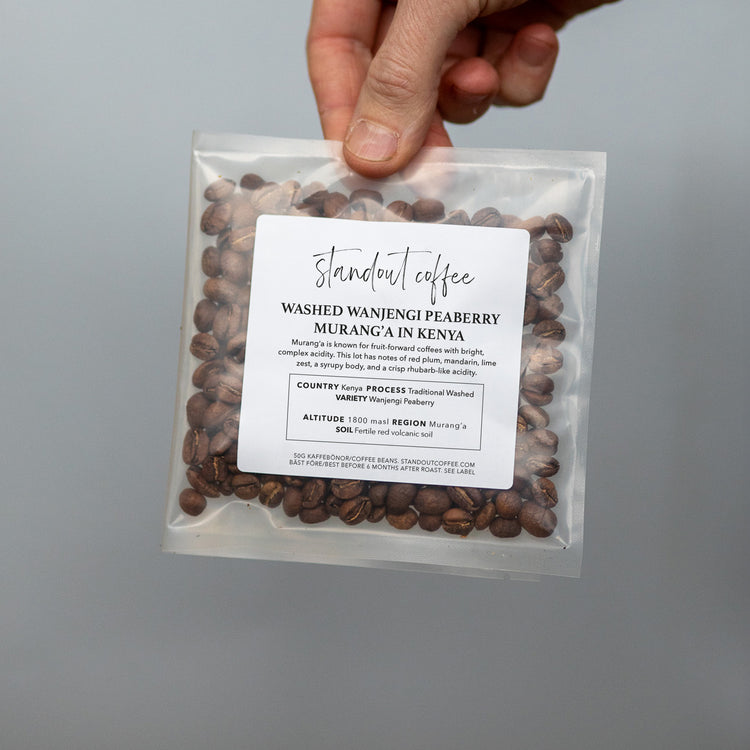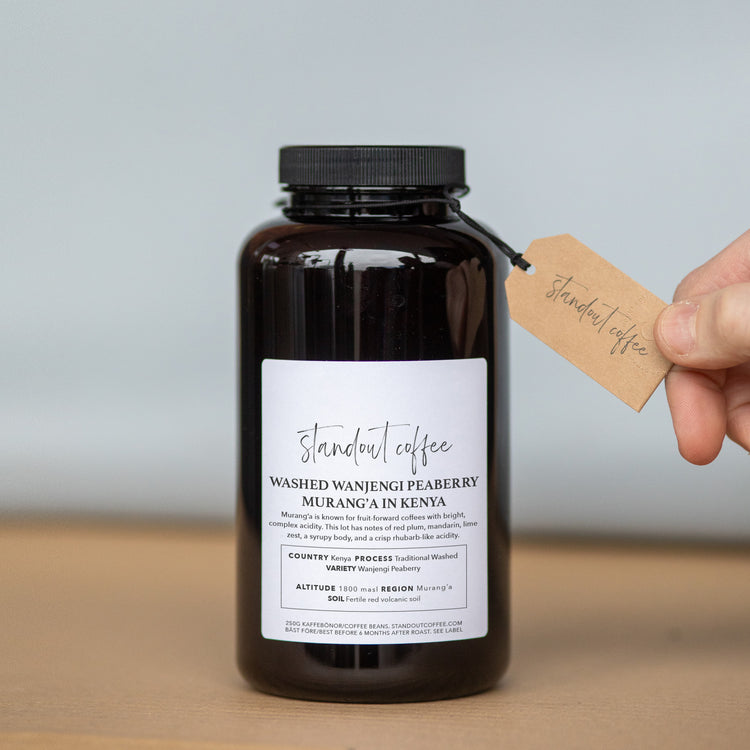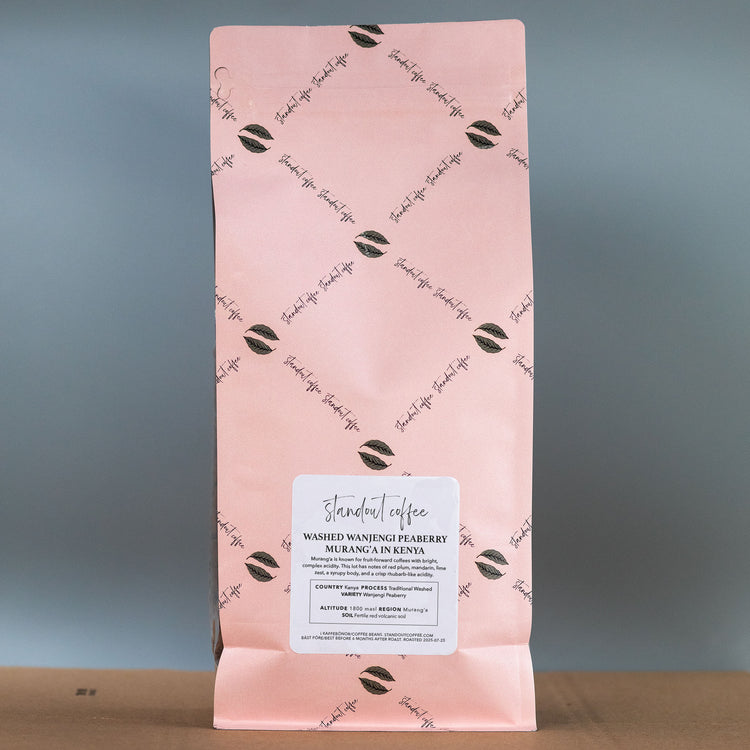


Product Details
Wanjengi PB is a Kenyan coffee from the Murang'a region, specifically grown on the western slopes of the Aberdare Mountain range. It is known for its fertile red volcanic soil and optimal climate, featuring warm days and cooler nights that allow the beans to develop slowly and accumulate sugars.
The coffee is processed using the traditional Kenyan washed method, and is a blend of SL28, SL34, Ruiru 11 and Batian cultivars. Wanjengi is one of four factories operated by the Kahuhia Coffee Growers Cooperative Society (CGCS).
Taste description: The Murang’a region is known for fruit-forward notes with bright, complex acidity. This particular coffee has notes of: Red plum, stone fruit, mandarin oranges, lime zest with a syrupy body and a crisp rhubarb-like acidity with a complex and long-lasting finish.
Key characteristics:
- Region: Murang'a, Kenya
- Altitude: 1800 meters above sea level
- Soil: Fertile red volcanic soil
- Process: Traditional Washed
- Cultivars: SL28, SL34, Ruiru 11 and Batian
- This PB coffee is grown on the temperate slopes of the Aberdare Mountain range. Fertile red volcanic soil provides plenty of nutrients for growing trees while warm daytime and cooler nighttime temperatures create the best environment for beans to develop slowly and amass as much sugar as possible. The resulting cup profile is fruit-forward with complex acidity – a classic Kenyan.
Other details:
This coffee was grown by smallholder farmers living in and around Wanjengi Factory (as wet mills are known in Kenya) in Kenya’s Murang’a County. Farms sit at altitudes of 1,600 to 1,800 meters above sea level along the western slopes of the Aberdare Mountain range. The climate and geography of Murang’a, particularly in this area, are well-suited for coffee production. The county boasts the fertile red volcanic soil and cool temperatures that coffee loves and for which this renowned growing region is known.
Wanjengi is one of four factories operated by the Kahuhia Coffee Growers Cooperative Society (CGCS). The others are Ngwethe, Wanjengi and Gathinja. Kahuhia CGCS, in total, has approximately 3,000 active members, and around 1,500 of these members deliver to Wanjengi factory, making it one of the larger mills in the society.
Farmers selectively handpick cherry and deliver to Wanjengi factory the same day. Cherry is sorted at intake where under- and over-ripes, along with any foreign matter, are removed. The role of the cherry clerk, who must ensure that only the ripest cherry is processed, is of paramount importance. Farmers will not be allowed to submit sub-par cherry and must take any rejected cherry home with them to dry on beds or mats. This cherry can then be submitted at the end of the season as mbuni grade for a much lower price. In this way, farmers are incentivized to only pick cherry that is truly at its peak.
Cherry moves straight from intake to the hopper and is pulped using a disk pulper. Pulped cherry is fermented and then washed with water from the nearby Gathamba River to remove any remaining mucilage. Parchment is predried, where employees remove any damaged parchment, and then moved to raised beds to finish drying. Here, it is turned regularly to ensure even drying and is covered at the hottest part of the day and during evenings to prevent cracking and/or condensation. Drying time is usually around two weeks and depends on the weather.
Once dry, parchment is delivered to Kahawa Bora Millers, one of our partner companies in Kenya. The mill has the capacity to mill smaller lots separately to help preserve quality and traceability.
PB stands for peaberry. Peaberry is a name given to a very specific shape of coffee bean. In Spanish, peaberries are called “caracol”, which means “snail”. The name aptly describes the shape of the peaberry bean, which appears slightly curved in on itself.
Peaberries are the result of a natural mutation in the coffee cherry. Whereas there are usually two beans nestled together in each fruit, a cherry with a peaberry mutation only forms one bean. Thus, peaberries are a single, rounder bean.
Peaberry mutations occur in approximately 5% of all coffee. The beans are known for being rounder, smaller and denser, which can contribute to a more even roast color when handled correctly. Many people find peaberries to have a sweeter flavor profile, as well.
Since peaberries are a natural mutation that is not visible from the outside of the cherry, peaberries must be sorted out during the screen grading stage of dry milling. The peaberry screens have the smallest holes, which are oblong to allow the rounder beans to fall through.
Amount
You can get this coffee in 50g bags, 250g jars, or 1kg bags — all whole beans roasted for filter brewing or a slightly edgy espresso. Our specialty range bridges everyday and competition-style coffees, delivering vibrant and distinctive flavors.
In the Jar
Each 250g jar is roasted to bring out the clarity and character of the coffee, whether you’re brewing a V60 or dialing in a bright, expressive espresso. Packed and shipped on demand for maximum freshness. Open it like you would a bottle of champagne — if you’re lucky, you’ll get the swoosh and an instant hit of aroma.




